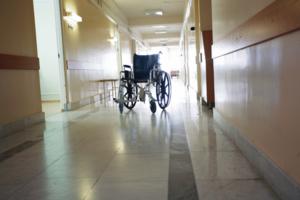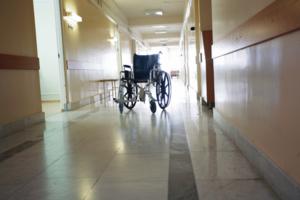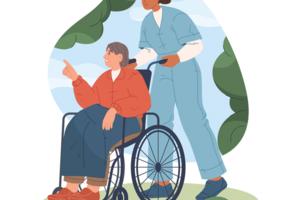Senior Living
/Health
‘Strong Grandma’ is record-holding powerlifter at 95
At 95 years old, Catherine Kuehn wasn’t just lifting weights. She was a competing powerlifter — one worthy of her own documentary.
Presented by The New Yorker, “Strong Grandma” follows Kuehn as she reminisces about the love and loss of her husband while preparing for what may be her final competition.
According to Open Power Lifting, ...Read more

50-year legacy: Vietnamese boat people thrive as fishermen
SAN JOSE, Calif. -- Aboard his boat in Moss Landing harbor, Tai Huynh, 71, bent over a pile of grenadier, then flung one of the deep sea fish into a large bin. Next to him, Tham Vo tipped them into a 500-pound crane lift box, swigging glass bottles of Heineken between loads.
In just over two hours recently, the pair offloaded 3,854 pounds of ...Read more

When they don’t recognize you anymore
It happened more than a decade ago, but the moment remains with her.
Sara Stewart was talking at the dining room table with her mother, Barbara Cole, 86 at the time, in Bar Harbor, Maine. Stewart, then 59, a lawyer, was making one of her extended visits from out of state.
Two or three years earlier, Cole had begun showing troubling signs of ...Read more

When they don't recognize you anymore
It happened more than a decade ago, but the moment remains with her.
Sara Stewart was talking at the dining room table with her mother, Barbara Cole, 86 at the time, in Bar Harbor, Maine. Stewart, then 59, a lawyer, was making one of her extended visits from out of state.
Two or three years earlier, Cole had begun showing troubling signs of ...Read more

Why cameras are popping up in eldercare facilities
The assisted living facility in Edina, Minnesota, where Jean Peters and her siblings moved their mother in 2011, looked lovely. “But then you start uncovering things,” Peters said.
Her mother, Jackie Hourigan, widowed and developing memory problems at 82, too often was still in bed when her children came to see her midmorning.
“She wasn�...Read more

Why cameras are popping up in eldercare facilities
The assisted living facility in Edina, Minnesota, where Jean Peters and her siblings moved their mother in 2011, looked lovely. “But then you start uncovering things,” Peters said.
Her mother, Jackie Hourigan, widowed and developing memory problems at 82, too often was still in bed when her children came to see her midmorning.
“She wasn�...Read more

Retired officer called an ‘inspiration’ at birthday bash. At 104, he may be oldest cop in US
SAN LEANDRO, Calif. — Two days after his 104th birthday, retired Oakland police Officer Toft Jessen was celebrated Thursday by dozens of Oakland police officers past and present, along with many others who lauded him as “an impressive individual” whose achievements are inspirational.
Jessen, a World War II veteran who during his nearly 37...Read more

He'd all but forgotten he had a defibrillator. It reminded him it was there – 22 times
In 2016, Bill Miller finally went to the doctor to find out what was causing his dry and annoying cough. Tests indicated he had a heart attack in the past and was now in heart failure.
Although doctors later implanted a defibrillator to restore a normal heart rhythm if needed, Miller quickly became used to the device under his skin. Eventually,...Read more

Travel Trending with Kathy Witt: AmaWaterway’s AmaMagna shows off the best of the Danube River
We stood on the Danube Promenade on the Pest side of Budapest, not far from the architecturally stunning Hungarian Parliament building, where dozens of shoes—men’s, women’s and children’s—lined the riverbank. Yellow ribbons inscribed with affirmations like, “we will dance again,” encircled each shoe.
Installed 20 years ago, the �...Read more

When the pandemic closed her mom's nursing home to visitors, she moved in
When the CEO responsible for a nursing home in Pittsburgh learned the facility would have to ban visitors during the COVID-19 pandemic lockdown, she immediately thought of JoAnne Klimovich Harrop, one of the residents' daughters.
"She was her mom's lifeline, and we couldn't cut off her mom's lifeline," Debbie Winn-Horvitz said.
Harrop wasn't ...Read more

Pickleball is here to stay. Why this sport is more than just a trend
ATLANTA -- Pickleball isn’t just a passing trend — it’s a full-blown wellness movement, bringing people together like never before.
Since its pandemic-era boom, the sport has more than tripled, with almost 20 million Americans enjoying its physical and mental benefits in 2024, according to the Sports & Fitness Industry Association.
Chris...Read more

AI model could use heart rhythm data to detect premature aging and cognitive decline
Electrocardiogram tests – which measure the heart's electrical activity – could someday be paired with an artificial intelligence model to detect premature aging and cognitive decline, new research suggests.
The study found people with accelerated ECG age had lower cognitive test scores than those experiencing normal aging. The findings are...Read more

Georgia WWII veteran, 100 years old, to receive French Legion of Honor
ATLANTA -- Alan Kinder was touched last year when the strangers he encountered during his trip back to Normandy gratefully hugged and kissed him. He had returned to France with other World War II veterans so they could mark the 80th anniversary of D-Day, the allied invasion of Europe.
Still buoyed by that warm reception, the 100-year-old ...Read more
Georgia WWII veteran, 100 years old, to receive French Legion of Honor
ATLANTA -- Alan Kinder was touched last year when the strangers he encountered during his trip back to Normandy gratefully hugged and kissed him. He had returned to France with other World War II veterans so they could mark the 80th anniversary of D-Day, the allied invasion of Europe.
Still buoyed by that warm reception, the 100-year-old ...Read more

Does Wordle help? Experts reveal ways keep your brain sharp
FORT LAUDERDALE, Fla. -- Will playing Wordle regularly fend off Alzheimer’s? Will the fish oil you take daily keep your memory sharp?
Many people think it’s worth trying anything to help with brain health. After all, the forecast is worrisome: The number of people living with dementia, including Alzheimer’s, is expected almost to double ...Read more
At 102-year-old, he still works preparing taxes
HENDERSON, Nev. -- He’s 102 years old and he can still do your taxes.
As a veteran, pilot and tax preparer, centenarian William Brew has stories to tell. Born in 1923 in Idaho, Brew has been to places that don’t even exist anymore, fought in World War II and lived through some of the most pivotal moments in American history, but now lives ...Read more

At 102-year-old, he still works preparing taxes
HENDERSON, Nev. -- He’s 102 years old and he can still do your taxes.
As a veteran, pilot and tax preparer, centenarian William Brew has stories to tell. Born in 1923 in Idaho, Brew has been to places that don’t even exist anymore, fought in World War II and lived through some of the most pivotal moments in American history, but now lives ...Read more

David Beckham’s intense workouts ahead of the big 5-0
Iconic footballer turned People’s “Sexiest Man Alive,” David Beckham has about done it all. Retired for 12 years, the soccer star turns 50 in May. But the “Bend It Like Beckham” namesake isn’t letting age keep him from the gym. Despite his age, he’s bulking up and building his athleticism in new ways five to six days a week.
“My...Read more

Mediterranean-style diet linked to better brain health in older Hispanic and Latino adults
Adhering to a Mediterranean-style eating pattern may help Hispanic and Latino adults strengthen the tissue connections in their brains, supporting overall brain health and potentially contributing to better cognitive outcomes, new research suggests.
The largest brain health benefit came from eating whole grains and fish, according to the ...Read more

Basketball coach didn't think his symptoms were a big deal. Good thing he went to the ER anyway
When Walt Morris started experiencing a handful of symptoms in early 2022, he downplayed every one of them.
Neck pain? Must be stress.
Headaches? Nothing a little ibuprofen and ice couldn't fix.
Erratic heart rate? Probably too much caffeine.
Aching jaw? Maybe he was grinding his teeth. Or, it'd just been a long week of teaching driver's ...Read more







